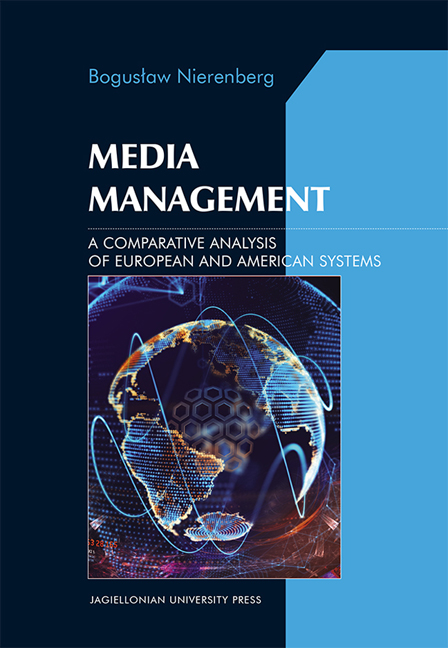Summary
Published online by Cambridge University Press: 10 January 2018
Summary
The aim of this work was to introduce the most crucial academic achievements of the scholars who deal with media management all over the world into Polish scientific knowledge and usage. Their most important elements were created by the scholars working in the United States and the Scandinavian countries, especially in Sweden and Finland. Many achievements in the field of media management are inseparably linked to the media economy. This work, therefore, is based on this assumption.
As previously mentioned, there are few scholars concerned with this issue in the Polish scientific community and even less, lest say: if any, dissertations devoted to it. Thus, in this respect, the work is pioneering and the author is aware of the fact that it might not be flawless, as it is oft en the case with pioneering research. The author also expects to hear not only from the scientific community but also from media practitioners, since management in general, while media management in particular, is both a theoretical and a practical field. It requires media managers to possess a range of managerial, economic, psychological and even artistic skills. As it was highlighted in the introduction, one of the most necessary skills a media manager should possess is the ability to forecast future trends and the media industry development. Certainly, every prognosis is encumbered with some mistake and in the case of the branch of economy which develops as rapidly as media industry and the turbulent environment the mistake may turn out to be so big that it may subject the forecaster to ridicule.
Dennis Mc Quail justly points out that “history of previous technical evolutions in communication (…) says that one needs to remain careful when forecasting the future events based on technical options.”
Having made this reservation, it seems that the coming years of media's operation and consequently media management will be defined by several processes and factors:
Dual nature of media businesses
Information as goods independent of any classical rules of economics
A shift from hierarchical to network structures as they are more efficient at using a resource such as information, as well as reaching goals of media organizations
Digitization and convergence as indicators of new structuring of the media market.
- Type
- Chapter
- Information
- Media ManagementA Comparative Analysis of European and American Systems, pp. 193 - 198Publisher: Jagiellonian University PressPrint publication year: 2016



